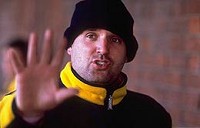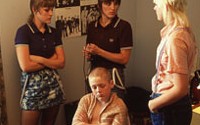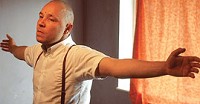 Totally autobiographical
Totally autobiographical Over the last decade, Shane Meadows has established himself as a force to recon with in British cinema, from his attention-grabbing debut Twentyfour Seven to the off-beat British "Western" Once Upon a Time in the Midlands. His latest project is the stunner This Is England, which won the Best British Independent Film award at the Bifas several months before it hit cinemas. And deservedly so, as it tells an unflinching story of racism and violence through the impressionable eyes of a 12-year-old in 1983 (played by the astonishing Thomas Turgoose)...
Over the last decade, Shane Meadows has established himself as a force to recon with in British cinema, from his attention-grabbing debut Twentyfour Seven to the off-beat British "Western" Once Upon a Time in the Midlands. His latest project is the stunner This Is England, which won the Best British Independent Film award at the Bifas several months before it hit cinemas. And deservedly so, as it tells an unflinching story of racism and violence through the impressionable eyes of a 12-year-old in 1983 (played by the astonishing Thomas Turgoose)...
You've never made a film set in London. Has this been intentional?
Shane Meadows: I'm obviously first and foremost a British filmmaker on a global scale, but when it comes to narrowing it down, I really feel like my voice is in the Midlands and outside of London. Obviously, when you're raising money, you have to go down there and play the game. But it feels quite different. You do feel independent. In London, there must be thousands of people in the business of making films, whereas in Nottingham or Sheffield, you're probably talking about below a hundred. So there aren't thousands of people scrapping for the same money and for the same jobs. I went out in Nottingham the other night, and there's a really beautiful community of people who are really supportive. It's not this back-stabbing thing, high-rent, high-cost, high-tension. Up here we are independent filmmakers and there's a lovely sense of camaraderie.
How did you find Thomas Turgoose?
It was one of those situations where we were getting quite close to the wire, and we'd been all over the place - Manchester, Leeds, Birmingham, Nottingham. And we'd found all of the cast except Shaun, which was quite worrying. I rehearsed over three or four months with people trying different things, but during the last 10 per cent of that we were still looking. We ended up getting a specialist casting director, Des Hamilton, who had cast the kid in Ratcatcher and had this technique of working where he went into community centres, council estates, arcades, shopping centres, and would go and find the roughest, most real kids. He finds kids who'd sat around the streets smoking and drinking and had no interest in being in a film, though the result of that search turned out to be the most fruitful thing that could've happened. He is the film, after all.
How was Thomas to work with?
He's pretty much flawless. As a director, your job can range from having to lean on someone to get a performance out of them, to someone being so built for the part that all you have to do is make them feel confident and comfortable and assured of what they're actually doing, and you just wind them up and watch them go. The only thing I had to do with Tommo, was make him believe. Like he hated wearing all the really wank clothes at the beginning, as there were girls standing around watching, and on a personal level he found it really embarrassing. So I had to chat to him saying, 'For the transformation to work, you have to look like a dweeb!' So bizarrely it was the most different actor-director relationship I've ever had. It was basically like working with myself at that age. He was in school a lot less when we first started, so he had a lot of things to overcome. He went from doing an hour or two a day in school to 12 hours a day on the film-set where he was in every scene bar three.
The film isn't as violent as you'd expect a skinhead neo-Nazi movie to be.
Yeah, everyone was expecting The Football Factory meets Romper Stomper. The violence in the film isn't down to them being skinheads. The violence at the end is about personal torture. Ultimately, the skinhead side of the film is what I wanted it to be, which is to show skinheads as they really were and as I saw it from the inside. The 80s was still a time when the skinheads I hung around with understood where they were from. They knew they weren't original 1969 skinheads, but they wanted to be true to that. It was always a working class thing. There were no middle class skinheads where I came from. We were really proud of being working class and were going to wear the equivalent of work-boots, jeans, a white shirt and some braces, which we can all afford, and are going to create an image of something so powerful. So as a kid I was very drawn to that idea and was made to feel very proud of working class. It was political but it was never extreme, one way or the other. Some would be left or right wing - as in terms of labour or conservative rather than militant or fascist - and the bands were much the same. There was very little in the way of ethnic minorities. There might have been one family running a Chinese restaurant, and one Asian or black family. Even on the newspapers or on TV, things were very different. I can't even say the words that were being used on TV. If you say one of those words now, in any city centre, and you'll be lucky if you get away with it.
It's interesting that in the film, the racist figure Combo is the one who expresses the strongest anti-war views. He's certainly not a stereotypical skinhead.
Like a lot of those people, Combo is affected and damaged by his own life. What tends to happen with characters is that they're not fleshed out, but in my films people tend to bring their own stories to the film. Stephen Graham, who plays Combo, he has a mixed-race heritage. He has a Swedish grandmother, a fully Jamaican grandfather and brothers who look black, but Stephen is just very fair skinned. So when I offered him the part, he rang me one night at 1 o'clock in the morning, and he was beside himself. He said, 'You've asked me to play this extreme right-wing character. But I need to tell you that my Dad's black.' I had no idea! So because he wasn't as dark skinned as his brothers, he was never quite sure if he fitted in. And I thought it was very brave of him to bring it forward and use that complication for his character. So if you watch that scene with him and Milky at the end, knowing that's what he was thinking, you can see jealousy in his eyes - he's jealous the guy is black.
Like Shaun in the film, were you hanging around with a gang who were older than you?
Oh, completely. My sister, who was older than me, was going out with a skinhead who was older than her. I was 11, she was 14 and her boyfriend was 16 - and all of his mates were older than him. So I was always the youngest person. I got sent up the garden with a girl called Smell, because I was doing everyone's head in. Everyone was snogging, and getting off with each other, and I was like, 'Where's my girl?' She was a bit too developed and experienced for me, but it seemed to work for a bit. All of those things happened. I went hunting with them. There was a lad called Gadget who was one of my best friends, and we were always competing against each other because we were the youngest. It's totally biographical.
So it's probably the most personal film you've made then?
It's a prequel to everything. A Room for Romeo Brass happened after that process. I went from being this scruffy haired kid and was literally transformed. I remember being given my first Ben Sherman by a guy called Woody, which was way to big for me. And someone else gave me a Crombie that wouldn't fit a 2-year-old child, so I had this massive shirt and this tiny Crombie! But it was part of the uniform. I still have the cross tattoo - on the same hand and the same finger as Shaun. It's really as close to the bone as you can get. But at the same time, you have to make a film and make it interesting, so you can't have a shot of you cleaning your teeth just because you did that. It's boring!
Did you ever witness something like the National Front?
Yes, I did. I actually went to a meeting in a house. I never signed up to join. I was like Shaun - I got it but at the same time I was thinking, 'Why haven't I got a comfortable chair? My back's hurting!' So I wasn't really mesmerised by it. But the thing that stayed with me was that it wasn't just skinheads. It was local farmers who came. That's what I hate about people's selective memory. They think the National Front was just skinheads, but it wasn't. It was much more widespread than that. I tried to relate that on the screen.
Why is there so much nostalgia for the 1980s now?
If you look back on the period, the 1980s has never been seen as cool. You think of the music, and it always has a kitsch quality to it because everyone looks so ridiculous. Even the 90s, with The Stone Roses and other bands, was cool before the 80s. It really missed the boat! The 60s was always cool, even then. That was my dad's era and I was always jealous of that. But now, as an adult, looking back, we were part of this mental time. It was the most enormous amount of tribes that could have ever existed in one place. In the 60s, it was mods and rockers and hippies and casuals, whereas in the early 80, there was goths, punks, mods, skinheads, new romantics, casuals, metal heads - the streets looked completely different. You go into town now and you can't tell one kid from another; you don't know what they're into. You can sort of tell a skateboard kid because his trousers are halfway down his legs, but that's about it. Back then, people wore their hearts on their sleeves. It was a really bold time. CDs were being made, video recorders were coming in, the landscape was changing. No-one knew if they had a future. It's not like now. There was no satellite. Kids were still out on the streets playing all the time. For me, it was the last great hurrah. People don't take those chances anymore. Everyone's far too reserved. Men look like women, women look like men.
Do you think that your unhappy experiences on Once Upon a Time in the Midlands fed into making Dead Man's Shoes and This is England?
Once upon a Time in the Midlands, when I did it, it wasn't until a few months later that I realised how disappointed I was with what I'd made - through not having a genuine final cut for the first time and also having to get audience figures. It was a horrible experience politically. I had this aim of trying to get a wider audience and the complete opposite happened. It ended up being the least like my films. So Dead Man's Shoes was a massive reaction to that. You can take £3.5 million and shove it; I'll take £750,000 and try and make the best film I've ever made.



SHANE MEADOWS
born 26.Dec.72
Uttoxeter, Staffordshire
FILMOGRAPHY


ONCE UPON A TIME IN THE MIDLANDS (2002)
A ROOM FOR ROMEO BRASS (1999)
TWENTYFOUR SEVEN (1997)
SMALL TIME (1996)
